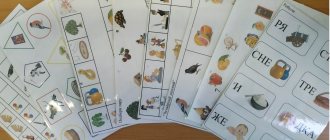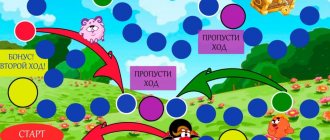Automation of the R sound in adults depends on the severity and cause of the incorrect pronunciation. The correction process differs little from that for children; it includes reading syllables, words, and texts with a problem letter. Anyone can conduct classes independently, at home. When producing sound in children, speech therapists advise using mechanical methods of influencing the articulatory apparatus. When correcting sound in an adult, it is better to adhere to imitative methods. This allows you to find the desired position, position during pronunciation.
Why does mispronunciation occur?
The sound R is sonorant, voiced, consonant, and is one of the most complex in the Russian language. Children begin to pronounce it later than others. Sometimes pathology drags on for many years due to the wrong approach to the problem. Long-term inactivity leads to a worsening of the situation; with age, a person gets used to saying “burly”; it is more difficult to relearn than to correct at an early age.
Incorrect articulation may result from:
- ingrained habits of incorrect pronunciation since childhood;
- speech apparatus defect: short frenulum, long or thick tongue, malocclusion, high palate;
- hypodynamia of the articulatory organs, when the muscles work weakly, a person is unable to put them in the desired position;
- incorrect speech perception, hearing loss;
- speech therapy disorders (dyslalia, alalia, rotacism, etc.);
- incorrect position of teeth.
It is necessary to determine the causes of incorrect speaking from childhood in order to facilitate correction. Problems of speech apparatus defects are dealt with by an orthodontist and a dentist. Physical inactivity can be corrected by a speech therapist, or in severe cases, together with a neurologist. When there is a problem with hearing, an audiologist and an otolaryngologist are involved in the work.
Automation of the sound P in phrases (in reverse syllables):
| New fence. The choir sings. Raya has a tan. Home yard. Strong boxer. Poisonous fly agaric. To push back. I'll go to the market. | Delicious marshmallow. Russian cheese. Drink kefir. Buy a samovar. Fairy tale "Moidodyr". Number five. Embroider a pattern. I'll sweep the yard. |
Automation done right
Automation involves honing the pronunciation of a certain sound. It is necessary to move on to the process when an adult can repeat P several times without a flaw. After a single pronunciation, they move on to reading syllables, words, sentences, texts. For automation to be successful, it is important to follow the basic rules for its implementation:
- It is necessary to conduct classes daily to achieve positive consolidation.
- Before direct automation, you need to warm up your speech apparatus. For gymnastics, special exercises are suitable to help hone the skill of pronouncing the sound R. You can stretch your mouth wide and tense in a smile, stick your tongue forward and bite its tip with your teeth. Make clicking sounds, like small children do when playing horse. Stretching out your tongue, reach the tip of your nose and chin. The exercises will be useful for adults who have already learned to pronounce R. They help to stretch the frenulum, work out the ligaments, and warm up the muscles of the tongue before automation.
- For automation to be successful, you need to ensure the correct placement of the articulatory apparatus. When pronouncing R, the teeth should be open, the mouth should be half-open, the tongue should be stretched to the palate with the tip, and be in a tense state. There should be an opening between the palate and the tip of the tongue for the passage of vibrating air. Vibration is produced by the vocal cords. The air stream is strong and comes out at the end of the tongue, stimulating the organ and causing it to vibrate.
- When automating the sound P in an adult, you need to adhere to the basic rule: transition from easy to complex material. First, syllables, words, sentences, tongue twisters, phrases, quatrains are analyzed, then they move on to reading texts.
Syllables
Adults, like children, need to start honing their pronunciation on sound fusions. First, syllables are pronounced where the sound P is in a closed position, after which you can switch to an open position and read more complex combinations:
- The first should be the sound combination DR. First, a person should try to pronounce it clearly, then switch to the syllables: udr, yudr, odr, adr, kernel, ydr, using all the vowels of the alphabet. If a syllable creates difficulty, you should concentrate more on it.
When automating the sound P in syllables, you need to pronounce it protractedly, for a long time, achieving maximum vibration during pronunciation. It turns out that the person exaggerates the process of speaking R.
- Then the sound combination DR is pronounced with an open vowel, R is in a closed position. It is important to extend it along with the vowel. An adult is asked to read the syllables: dra, dro, dro, dri, dra, dra, dra.
- Reading syllables with the letter P and vowels in open or closed position: ar, op, ir, ur, yr, yur, er, ra, ro, ru, ri, ry, re, ra.
Words
You need to enter words after a person has mastered the pronunciation of syllables. The transition process is smooth, to the syllables dra, dro, dru, dri, etc. You need to add a consonant according to the meaning, forming the words: friend, trembling, drama. It is important to follow the rule from easy to difficult. First they read words with one syllable, then form them with two or three. The last stage is reading words with 3 syllables, where 2 letters R are found.
Automation begins with words where P occurs at the end of the word, or with simple combinations: peace, feast, ball, rubbish, boron, gift, steam, heat, punishment, quarrel, time, lyre, bazaar, carpet, stupor, juggler, tomato , commander, passenger, officer, fitter. After that, you can move on to reading words with the letter P in the middle: vigilant, window, five, locomotive, jacket, brake, casket, starling, syringe, desk, mink, curtain, article, frost, etc.
When the skill of pronouncing R at the end and middle of a word has been honed, a transition is made to words where the sound is at the beginning: cancer, rocket, rock, fateful, grow, Rita, sprout, shell, mitten, ruble, shirt, stream, gun, hand, lynx, fish, piano, face. It is more difficult to pronounce a sound when it comes after consonants: jump, twig, milk mushrooms, dranits, beauty, enemy, hail, friend, rule, hello, lingonberry, comparison.
You need to finish the work with words where the letter appears twice: porcelain, bloomers, conversation, open, consider, horizons, sort, marble, check, ice hole, parallelogram, rip.
When an adult can pronounce single words well, it is worth moving on to phrases. An important condition is that the first and second words begin with the letter P:
- Red shirt;
- sea shell;
- red lingonberry;
- frosty cloudberry;
- big waste;
- medical secret;
- rough road;
- railway transport;
- sea fish;
- elder sister.
The transition from working with words to sentences should be smooth. First, an adult learns to pronounce single words, moves on to phrases, and then sentences.
You can make them up from phrases invented earlier:
- ironing a red shirt;
- I see railway transport;
- there was a major waste;
- large sea fish;
- in the garden there are red lingonberries, etc.
When composing sentences, it is not necessary to add words with the letter P to phrases; they are given so that a person does not think about where to pronounce the desired letter. Often adults suffering from burr try not to pronounce complex words, replacing them with those that do not have the problematic letter, which is not correct. Automation can be considered successful when a person, without thinking, pronounces words with problematic sounds correctly.
Tongue twisters and tongue twisters
After the sentences, you can work with pure tongue twisters and tongue twisters. You should start with the first ones, smoothly moving to speed reading. Pure phrases help to hone the correct pronunciation of a certain sound in various positions, warm up the speech apparatus, and stimulate the muscles of the organs.
You can make up complete sentences yourself. You need to add a vowel to the letter: ra, re, op, ru, ry; and words in rhyme: kids, yard, thief, game, holes. It turns out:
- Ra-ra-ra there are children in our house,
- The chickens go re-re-re in the yard,
- Or-or-or turned out to be a thief bear,
- Ru-ru-ru we start the game,
- Ry-ry-ry doesn’t have a hole at the back.
You can use ready-made children's sayings for classes.
Tongue twisters should be selected according to age. Teenagers can start with children's ones, gradually moving on to complex ones. It is preferable for an adult to immediately attack difficult-to-combine tongue twisters:
The beaver is good for the beavers.
Turnips and radishes have strong roots.
As you know, beavers are kind. Beavers are full of kindness. If you want good things for yourself, you just need to call the beaver. If you are kind without a beaver, then you yourself are a beaver at heart.
Terenty salted mushrooms - Thirty-three barrels at once, Terenty ate mushrooms - Thirty-three barrels at once.
Lyrics
Texts are required to automate the sound R for adults. You can build work on them in various ways. If we are talking about homework, then simple reading of texts that contain many words starting with a given letter will do. You can retell passages or short texts to pronounce a problematic letter without thinking about its presence. As a rule, when a person reads, he sees a complex sound in advance and prepares for its pronunciation. When speaking out loud or retelling, this is difficult to do, which makes speech automated. If an adult does not pause while telling a story and speaks clearly, the process of sound automation can be considered complete.
The following texts are suitable for work.
As a rule, you can automate the sound P at home. You can achieve excellent results with daily exercise in 1-3 months. If after this period there is no change in speaking, you should seek help from a professional. Perhaps the cause of burr lies in defects of the speech apparatus.
The sound R in phrases (in reverse syllables in the middle of words):
| Old hill. Northern city. Mischievous sparrow. Short pile. A bright picture. Black cardboard. | Sea wind. Beautiful stamps. Royal coat of arms. Stainless jacket. Collect potatoes. Carrot juice. |
Automation of the R sound in phrases (with two R sounds in words):
| Smooth bars. Roma has bronchitis. Brave officer. Bronze award. See your brother off. Splash in the pond. | Throwing a cork. Jump from the mountain. Elastic spring. A simple pencil. We saw a zebra and a cobra. Walk down the aisle. |







